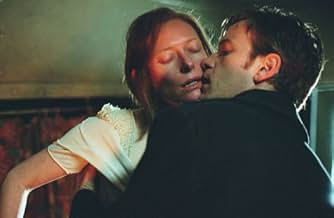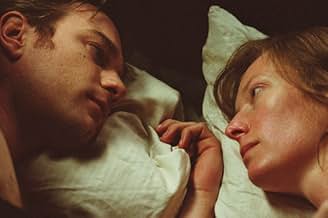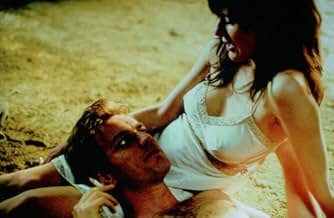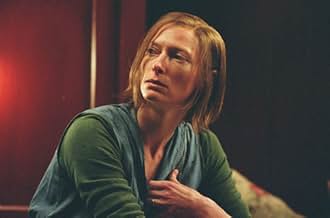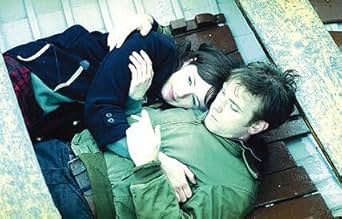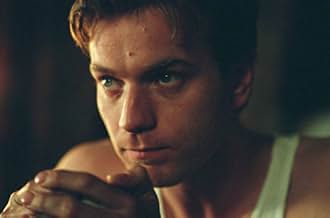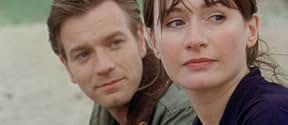A young drifter working on a river barge disrupts his employers' lives while hiding the fact that he knows more about a dead woman found in the river than he admits.A young drifter working on a river barge disrupts his employers' lives while hiding the fact that he knows more about a dead woman found in the river than he admits.A young drifter working on a river barge disrupts his employers' lives while hiding the fact that he knows more about a dead woman found in the river than he admits.
- Director
- Writers
- Stars
- Awards
- 7 wins & 17 nominations total
- Director
- Writers
- All cast & crew
- Production, box office & more at IMDbPro
Featured reviews
A thoughtful, unapologetic and non judgmental character study of Joe, one man, one distinctly unique yet common man. It is presented in the context of a mystery, but this is no mystery thriller. Thrill seekers, go elsewhere.
If you crave action, dialog, explanations and clear resolutions to a plot, I suggest you avoid this film. If you are fascinated by human complexity, admire beautifully crafted film-making, and can think and observe for yourself, this may be a rewarding experience for you. If you love and understand great acting you must see this film.
It is exquisitely filmed, in an understated and confident manner, using hue and tint as artfully as any great painter. Joe lives in a drab and uninspiring world, mostly of interiors; tight, constricted places, where the inhabitants are caged too closely, too much ever present in each other's spaces. When we are occasionally brought out into the world at large, this tight confining world is often seen to be surrounded by a distant, unreachable beauty. There are subtly beautiful panoramas of the lush greenness of Scotland off in the distance, out of reach of Joe, of all the people of his world.
The structure, the editing, the weaving of time present and time past is without conceit. There is no "look at how cleverly I did that transition" cutting. It is a perfect representation of editing unseen, unnoticed, the mark of brilliant editing. Everything comes together, simply and without explanation. Characters are presented simply, without prelude. Events occur, without justification. You must think and observe for yourself. If there are conclusions to be made, they must be yours.
If for no other reason, see this film to experience Ewan McGregor: He has been a reasonably attractive and adequate performer, in mostly rather forgettable productions, until now. Here he suddenly emerges as an actor of astounding depth and complexity, inhabiting, living, revealing another soul. Without any reservation this is a great performance. His subtlety, his inner directed creation of a complete individual, is simply remarkable. It is a complete, compelling, always true performance. You cannot look away from Joe. You must follow him, know him. Do you know him? Can you ever really know him?
The plot, what little of it there is, unfolds through character and behavior, with a minimum of dialog. There is much complete silence in this film. The score is understated, never telegraphing what you are supposed to feel or think. Indeed, I doubt that there is an answer to any question here. Who is Joe? What is Joe? That is not the point.
Here is Joe. This is what he is, this is what he has done. What will he do now? There is a quiet suspense, never quite gratified, which begins with the very first frame,a corpse, gently floating, photographed darkly, from below, so dark there is no face. A deceased, faceless female human being.
Joe's is the first face we see. That first glimpse of his eyes, told me that nothing would be what it seemed in this film. Joe sees something we do not see. So begins the mystery.
Nothing is jarring, nothing is false. Life is simply never quite what we think it is. Make no mistake. There is a real mystery here to be revealed. Not a contrived, plot dependent series of revelations. It is the unpeeling of the layers of a human being.
Much has been mentioned in this forum about the frequent sex scenes. They are achingly non-erotic, distanced and cold, and ultimately only functional. It is a passionless, desperate, mutually using and abusing kind of sex. Only one scene has heat. And that scene is not really sex. It is frustration, anger, vengeance, humiliation and desperation. This scene is truly horrible, truly frightening and truly revelatory.
I haven't told you much about the plot. That is deliberate. The plot works. It reveals the character. The progression of events is true, often surprising, but never false, never contrived. If you need to be told what is happening and why, this is not for you.
If you love great acting, by all involved, and appreciate the crafts and arts of film construction, I highly recommend "Young Adam".
(I have one question for anyone out there who might have a feasible answer: the title confounds me. There is no Adam. Nor is there any reference to an Adam. I could draw no path to or from Genesis. So why is this called "Young Adam"?)
If you crave action, dialog, explanations and clear resolutions to a plot, I suggest you avoid this film. If you are fascinated by human complexity, admire beautifully crafted film-making, and can think and observe for yourself, this may be a rewarding experience for you. If you love and understand great acting you must see this film.
It is exquisitely filmed, in an understated and confident manner, using hue and tint as artfully as any great painter. Joe lives in a drab and uninspiring world, mostly of interiors; tight, constricted places, where the inhabitants are caged too closely, too much ever present in each other's spaces. When we are occasionally brought out into the world at large, this tight confining world is often seen to be surrounded by a distant, unreachable beauty. There are subtly beautiful panoramas of the lush greenness of Scotland off in the distance, out of reach of Joe, of all the people of his world.
The structure, the editing, the weaving of time present and time past is without conceit. There is no "look at how cleverly I did that transition" cutting. It is a perfect representation of editing unseen, unnoticed, the mark of brilliant editing. Everything comes together, simply and without explanation. Characters are presented simply, without prelude. Events occur, without justification. You must think and observe for yourself. If there are conclusions to be made, they must be yours.
If for no other reason, see this film to experience Ewan McGregor: He has been a reasonably attractive and adequate performer, in mostly rather forgettable productions, until now. Here he suddenly emerges as an actor of astounding depth and complexity, inhabiting, living, revealing another soul. Without any reservation this is a great performance. His subtlety, his inner directed creation of a complete individual, is simply remarkable. It is a complete, compelling, always true performance. You cannot look away from Joe. You must follow him, know him. Do you know him? Can you ever really know him?
The plot, what little of it there is, unfolds through character and behavior, with a minimum of dialog. There is much complete silence in this film. The score is understated, never telegraphing what you are supposed to feel or think. Indeed, I doubt that there is an answer to any question here. Who is Joe? What is Joe? That is not the point.
Here is Joe. This is what he is, this is what he has done. What will he do now? There is a quiet suspense, never quite gratified, which begins with the very first frame,a corpse, gently floating, photographed darkly, from below, so dark there is no face. A deceased, faceless female human being.
Joe's is the first face we see. That first glimpse of his eyes, told me that nothing would be what it seemed in this film. Joe sees something we do not see. So begins the mystery.
Nothing is jarring, nothing is false. Life is simply never quite what we think it is. Make no mistake. There is a real mystery here to be revealed. Not a contrived, plot dependent series of revelations. It is the unpeeling of the layers of a human being.
Much has been mentioned in this forum about the frequent sex scenes. They are achingly non-erotic, distanced and cold, and ultimately only functional. It is a passionless, desperate, mutually using and abusing kind of sex. Only one scene has heat. And that scene is not really sex. It is frustration, anger, vengeance, humiliation and desperation. This scene is truly horrible, truly frightening and truly revelatory.
I haven't told you much about the plot. That is deliberate. The plot works. It reveals the character. The progression of events is true, often surprising, but never false, never contrived. If you need to be told what is happening and why, this is not for you.
If you love great acting, by all involved, and appreciate the crafts and arts of film construction, I highly recommend "Young Adam".
(I have one question for anyone out there who might have a feasible answer: the title confounds me. There is no Adam. Nor is there any reference to an Adam. I could draw no path to or from Genesis. So why is this called "Young Adam"?)
Young Adam is a powerful and atmospheric drama set on the canals between Glasgow and Edinburgh during the 1950s.
Ewan McGregor is Joe, a drifter working on a barge, when he and his boss find a body in the canal. As he begins an affair with the bargeman's wife (Tilda Swinton), we find out more about his previous relationship with the drowned woman (Emily Mortimer).
Adapted from the novel by Scottish Beat writer Alexander Trocchi, Young Adam is, in some ways, a kitchen sink drama a vivid picture of working class life in its unpleasant reality. One of the best examples of this type of film is Room at the Top (1959). But Young Adam has existentialist overtones: Joe is alienated and passive, and not only do his numerous sexual couplings offer him little pleasure, but in rejecting the only thing that could redeem him, he condemns himself to a meaningless life. This might sound too depressing, but screenwriter and director David Mackenzie gives the film great depth and sensuality. Very interesting. ****/***** stars.
Ewan McGregor is Joe, a drifter working on a barge, when he and his boss find a body in the canal. As he begins an affair with the bargeman's wife (Tilda Swinton), we find out more about his previous relationship with the drowned woman (Emily Mortimer).
Adapted from the novel by Scottish Beat writer Alexander Trocchi, Young Adam is, in some ways, a kitchen sink drama a vivid picture of working class life in its unpleasant reality. One of the best examples of this type of film is Room at the Top (1959). But Young Adam has existentialist overtones: Joe is alienated and passive, and not only do his numerous sexual couplings offer him little pleasure, but in rejecting the only thing that could redeem him, he condemns himself to a meaningless life. This might sound too depressing, but screenwriter and director David Mackenzie gives the film great depth and sensuality. Very interesting. ****/***** stars.
Spoiler warning !!
Although the audience may not realise it initially, this film is carefully constructed with two story lines, one of which is through flashbacks that blend so seamlessly with the 'present' that it feels like it's running in parallel. As well, the director is in no hurry to give the audience everything all at once. He lets the flashback story seep through the screen in its good time. However, he does plant along the way plenty of details that may seem a little strange but make perfect sense as the story unfolds. The best example is at the very beginning. Joe (Ewan McGregor) and his employer Les (Peter Mullan) fish a woman's dead body form the Glasgow-Edinburgh canal which their barge is working. In the same evening, when they are having supper in the cabin with Les' wife Ella (Tilda Swinton) and little boy, Les asks Joe if he thinks that it's murder. Joe breaks out into an almost poetic description of what he thinks has happened, that the woman committed suicide. This near-monologue is totally out of character with lowly barge hand Joe, until two things are revealed later: Joe the writer (or his aspiration to be one), and his relationship with the dead woman.
Not only the past, but even the present, is revealed ever so gradually. As the sexual liaison between Joe and Ella develops, we are under the impression that Ella is very much of an abused (though not physically or violently) wife totally under the control of her husband. It isn't until Les confronting Joe on the deck that we see an unexpected turn of events, with Les' short, crisp announcement of 'It's her barge'. Although Les has never been exactly a model husband, it turns out that Ella is the real boss, in a very literal sense. We now see the tough side of Ella. When Les packs his things and leaves, wondering when he can see his son who is now at boarding school, we can't help but feel a little sympathy for him.
The film is certainly not made to please the mainstream audience. First, on the practical side, it does not care about political correctness, and shows cigarette smoking scenes in abundance. The film is shot with a general tone of depressing gloominess, with a few well placed out-focused scenes, the most noticeable being the ending scene with Joe walking away from the river. Yet, there is a melancholic beauty in the sometimes grainy photography. At the very beginning, the long-range shot of the dock and background scenery is so beautifully framed that it can easily win a price at a photography contest. Equally melancholic is the general use of the cello in background music. Sound off is not used that much. In fact I only recall one, the sound of buses and other street vehicles, cutting from Joe with Ella in bed at the cabin of the barge to a flashback of a busy street scene of his re-encounter with his ex-girlfriend Cathie (Emily Mortimer). The motif of the hand mirror inscribed with loving words from Cathie to Joe is, however, slightly over-used.
As to my summary line, all of the more subtle exchanges in the film are made in silence, rather than with dialogue. The two best examples are of course Joe's seduction of Ella and his first encounter with Cathy (in that order in the film, but in reverse order chronologically). There is of course dialogue but by the time it gets to the dialogue, the parties have already established an understanding beyond words.
One reviewer makes an insightful comparison of Joe to Camus' Outsider. Indeed, rather than being portrayed as an irresponsible libertine, Joe is shown as a confused outsider, often driven by his own physical desire, but not entirely without sensibility. This persona is echoed by the title Young Adam, still young but post-Garden of Eden, tossed into a cheerless world and doomed to an endless exile.
The acting is first class all around. McGreagor shows that he is made of sterner stuff than needed for a light-sabre-happy Obi-wan Kenobi or a love-sick Christian. Swinton works the layers of Ella amazingly well, first the passive, guilt-troubled wife (particularly at the second liaison when Joe breaks the lamp) then the liberated woman temporarily carried away with ideas of divorce and remarriage, and finally very quickly coming down to earth again. More easily overlooked is Mullan playing the cockolded husband, maybe not to the stupendous height of the gentleman at Camelot, but with his own grass-root poignancy. Mortimer's role may not be as demanding as the other three's, but her competent portrayal of Cathie's endearing young charm is quite necessary to make Joe's subsequent remorse convincing.
Young Adam is not for everybody, but definitely a marvellous cinematic experience to those with the capacity to appreciate.
Although the audience may not realise it initially, this film is carefully constructed with two story lines, one of which is through flashbacks that blend so seamlessly with the 'present' that it feels like it's running in parallel. As well, the director is in no hurry to give the audience everything all at once. He lets the flashback story seep through the screen in its good time. However, he does plant along the way plenty of details that may seem a little strange but make perfect sense as the story unfolds. The best example is at the very beginning. Joe (Ewan McGregor) and his employer Les (Peter Mullan) fish a woman's dead body form the Glasgow-Edinburgh canal which their barge is working. In the same evening, when they are having supper in the cabin with Les' wife Ella (Tilda Swinton) and little boy, Les asks Joe if he thinks that it's murder. Joe breaks out into an almost poetic description of what he thinks has happened, that the woman committed suicide. This near-monologue is totally out of character with lowly barge hand Joe, until two things are revealed later: Joe the writer (or his aspiration to be one), and his relationship with the dead woman.
Not only the past, but even the present, is revealed ever so gradually. As the sexual liaison between Joe and Ella develops, we are under the impression that Ella is very much of an abused (though not physically or violently) wife totally under the control of her husband. It isn't until Les confronting Joe on the deck that we see an unexpected turn of events, with Les' short, crisp announcement of 'It's her barge'. Although Les has never been exactly a model husband, it turns out that Ella is the real boss, in a very literal sense. We now see the tough side of Ella. When Les packs his things and leaves, wondering when he can see his son who is now at boarding school, we can't help but feel a little sympathy for him.
The film is certainly not made to please the mainstream audience. First, on the practical side, it does not care about political correctness, and shows cigarette smoking scenes in abundance. The film is shot with a general tone of depressing gloominess, with a few well placed out-focused scenes, the most noticeable being the ending scene with Joe walking away from the river. Yet, there is a melancholic beauty in the sometimes grainy photography. At the very beginning, the long-range shot of the dock and background scenery is so beautifully framed that it can easily win a price at a photography contest. Equally melancholic is the general use of the cello in background music. Sound off is not used that much. In fact I only recall one, the sound of buses and other street vehicles, cutting from Joe with Ella in bed at the cabin of the barge to a flashback of a busy street scene of his re-encounter with his ex-girlfriend Cathie (Emily Mortimer). The motif of the hand mirror inscribed with loving words from Cathie to Joe is, however, slightly over-used.
As to my summary line, all of the more subtle exchanges in the film are made in silence, rather than with dialogue. The two best examples are of course Joe's seduction of Ella and his first encounter with Cathy (in that order in the film, but in reverse order chronologically). There is of course dialogue but by the time it gets to the dialogue, the parties have already established an understanding beyond words.
One reviewer makes an insightful comparison of Joe to Camus' Outsider. Indeed, rather than being portrayed as an irresponsible libertine, Joe is shown as a confused outsider, often driven by his own physical desire, but not entirely without sensibility. This persona is echoed by the title Young Adam, still young but post-Garden of Eden, tossed into a cheerless world and doomed to an endless exile.
The acting is first class all around. McGreagor shows that he is made of sterner stuff than needed for a light-sabre-happy Obi-wan Kenobi or a love-sick Christian. Swinton works the layers of Ella amazingly well, first the passive, guilt-troubled wife (particularly at the second liaison when Joe breaks the lamp) then the liberated woman temporarily carried away with ideas of divorce and remarriage, and finally very quickly coming down to earth again. More easily overlooked is Mullan playing the cockolded husband, maybe not to the stupendous height of the gentleman at Camelot, but with his own grass-root poignancy. Mortimer's role may not be as demanding as the other three's, but her competent portrayal of Cathie's endearing young charm is quite necessary to make Joe's subsequent remorse convincing.
Young Adam is not for everybody, but definitely a marvellous cinematic experience to those with the capacity to appreciate.
The films focus on translating the novels first person perspective is clearly an obsession for this director. Never is the audiences attention allowed outside of Joe's point of view. We see only what he sees, we hear nothing more and we remember his life in little snatches, moments of dark disgusting and secret clarity he keeps from the world.
The film starts with a corpse, a barely dressed woman floating in the Clyde that is fished out by Joe; a young man working the barges for reasons that are not immediately clear. This brutal beginning in which we see Joe lay a tender hand on the cold dead flesh of the girl begins the film with a level of tension that rarely leaves the screen. Through his actions and - more importantly - his inactions we peel away the outer layers of a man on the run from himself, from responsibility and from guilt. We see him commit two murders by mission of inaction and we see him quietly dealing with that in one last lingering shot that tells us he will never change.
Joe is sexually driven to destroy life around him and he uses sex as a weapon against himself and against the possibility of settling or creating a future. He could be a writer, but he lacks the courage to read his own work. He could be a father, but he cannot face the thought of commitment. He could be a lover, but he makes love to women only as a means to an end, rejecting and pushing them away once the act is completed.
And this is the film in a nutshell. A relentless character study of an unpleasant man who punishes those around him for his own failings. Yes there is gratuitous sex in this film, but it has its place, it defines the moments of change in everyone else's lives while underlining the static character of Joe, played with utter brilliance by Ewen McGregor. The sex is cold, rather than erotic, reflecting the characters contempt for those he uses. Without the detailed sex scenes the film would be less than it is, but audiences expected to be titillated will come away disappointed.
Not without flaws this film has that perplexing title and a scene in which Joe beats his girlfriend after covering her with custard. The scene is alien to both the film and the character of Joe who gives no indication of being violent, rather a man that will walk out on a problem rather than face the awful possibility of confrontation. In fact Ewen McGregor seems embarrassed to play this scene, as though he too cannot link this outburst to the character he is playing.
But this minor quibble apart the film remains an artistically shot work, played with brilliance by everyone. Its rare to see a film where the whole cast are brilliant, where the script is clearly cut and the direction thought through. The visual aspect of the film is also tremendous with each shot being laid out in front of us like a painting, a wondrous work of art that moves and flows to show us the 60's post war Brittan with utter clarity.
Hollywood please take note.
The film starts with a corpse, a barely dressed woman floating in the Clyde that is fished out by Joe; a young man working the barges for reasons that are not immediately clear. This brutal beginning in which we see Joe lay a tender hand on the cold dead flesh of the girl begins the film with a level of tension that rarely leaves the screen. Through his actions and - more importantly - his inactions we peel away the outer layers of a man on the run from himself, from responsibility and from guilt. We see him commit two murders by mission of inaction and we see him quietly dealing with that in one last lingering shot that tells us he will never change.
Joe is sexually driven to destroy life around him and he uses sex as a weapon against himself and against the possibility of settling or creating a future. He could be a writer, but he lacks the courage to read his own work. He could be a father, but he cannot face the thought of commitment. He could be a lover, but he makes love to women only as a means to an end, rejecting and pushing them away once the act is completed.
And this is the film in a nutshell. A relentless character study of an unpleasant man who punishes those around him for his own failings. Yes there is gratuitous sex in this film, but it has its place, it defines the moments of change in everyone else's lives while underlining the static character of Joe, played with utter brilliance by Ewen McGregor. The sex is cold, rather than erotic, reflecting the characters contempt for those he uses. Without the detailed sex scenes the film would be less than it is, but audiences expected to be titillated will come away disappointed.
Not without flaws this film has that perplexing title and a scene in which Joe beats his girlfriend after covering her with custard. The scene is alien to both the film and the character of Joe who gives no indication of being violent, rather a man that will walk out on a problem rather than face the awful possibility of confrontation. In fact Ewen McGregor seems embarrassed to play this scene, as though he too cannot link this outburst to the character he is playing.
But this minor quibble apart the film remains an artistically shot work, played with brilliance by everyone. Its rare to see a film where the whole cast are brilliant, where the script is clearly cut and the direction thought through. The visual aspect of the film is also tremendous with each shot being laid out in front of us like a painting, a wondrous work of art that moves and flows to show us the 60's post war Brittan with utter clarity.
Hollywood please take note.
Okay, this film isn't for everyone. A little dreary, a little bleak, and the love scenes weren't always attractive, but something in the dark simplicity got me.
McGregor is incredibly versatile, I didn't think once of the bohemian poet Christian, or of Obi Wan... he's taken on an unlikeable character with a slow moving plot and pulled it off beautifully.
Tilda Swinton plays the antithesis of a Hollywood seductress, which makes some of the love scenes uncomfortable, but refreshing. The acting, as a whole, is the entire film. The action between characters is subtle and intense, and although I may be biased as an Ewan fan, I thought it was perfect for a dark, rainy night!
McGregor is incredibly versatile, I didn't think once of the bohemian poet Christian, or of Obi Wan... he's taken on an unlikeable character with a slow moving plot and pulled it off beautifully.
Tilda Swinton plays the antithesis of a Hollywood seductress, which makes some of the love scenes uncomfortable, but refreshing. The acting, as a whole, is the entire film. The action between characters is subtle and intense, and although I may be biased as an Ewan fan, I thought it was perfect for a dark, rainy night!
Did you know
- TriviaEwan McGregor's nude scenes were originally going to be cut from the U.S. release, but after McGregor objected, the full-frontal nude scenes were put back in.
- GoofsIn a wide shot of the skyline of Glasgow from Kelvingrove Park, the Glasgow Tower can be seen on the horizon. The tower wasn't built until 2000.
- Quotes
Les Gault: What'd you do that for?
Joe Taylor: I had no use for it.
Les Gault: Must be worth something, though.
Joe Taylor: Not to me.
- Alternate versionsThe UK version contains a sex scene featuring Ewan McGregor. The MPAA has cut it from the US release for 2004.
- ConnectionsFeatured in Indie Sex: Censored (2007)
- How long is Young Adam?Powered by Alexa
Details
- Release date
- Countries of origin
- Official site
- Language
- Also known as
- Thời Trai Trẻ
- Filming locations
- Production companies
- See more company credits at IMDbPro
Box office
- Budget
- $6,400,000 (estimated)
- Gross US & Canada
- $767,373
- Opening weekend US & Canada
- $50,278
- Apr 18, 2004
- Gross worldwide
- $2,561,820
- Runtime1 hour 38 minutes
- Color
- Sound mix
- Aspect ratio
- 2.35 : 1
Contribute to this page
Suggest an edit or add missing content








